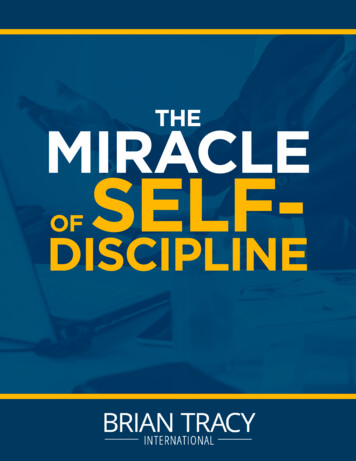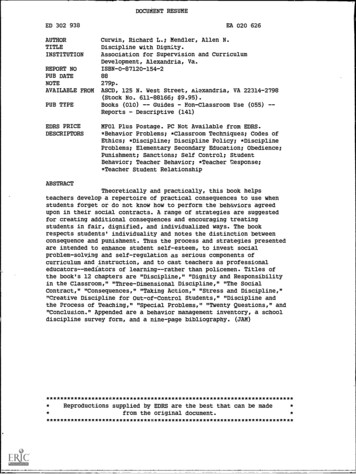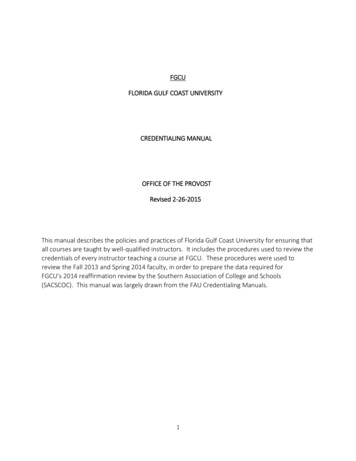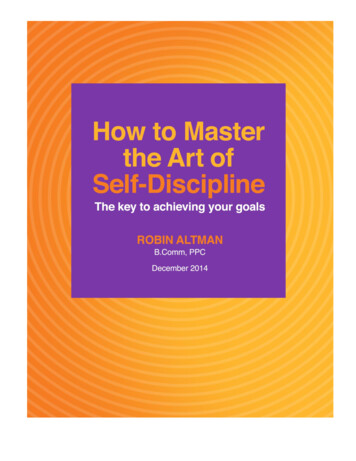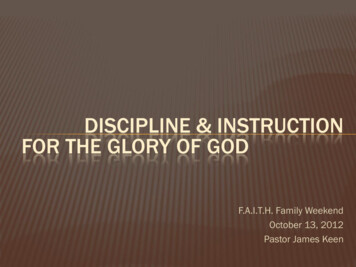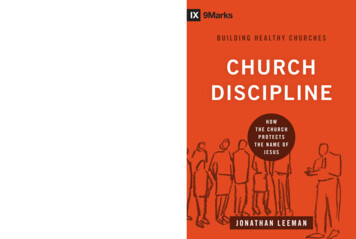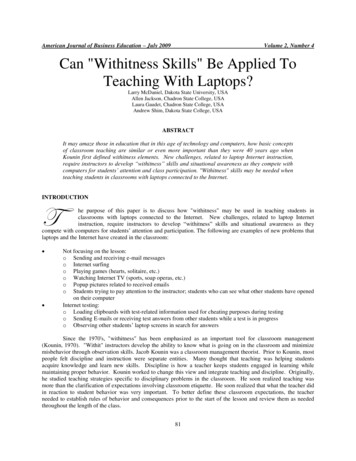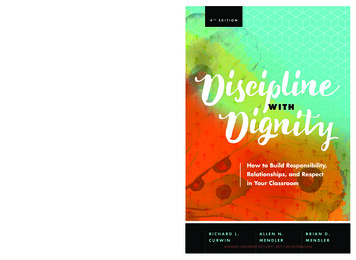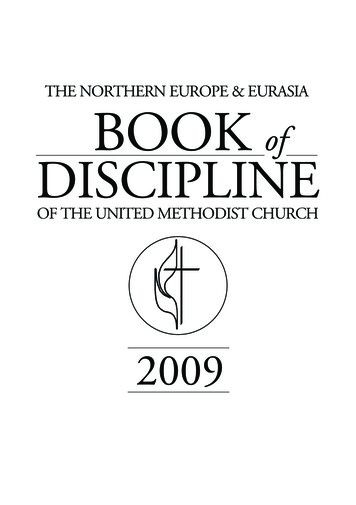
Transcription
The NORTHERN EUROPE & EURASIABook ofDisciplineof the United Methodist Church2009
Copyright 2009 The United Methodist Church in Northern Europe & Eurasia.All rights reserved.United Methodist churches and other official United Methodist bodies may reproduce up to 1,000 words fromthis publication, provided the following notice appears with the excerpted material: “From The Northern Europe& Eurasia Book of Discipline of The United Methodist Church—2009. Copyright 2009 by The United Methodist Church in Northern Europe & Eurasia. Used by permission.”Requests for quotations that exceed 1,000 words should be addressed to the Bishop’s Office, Copenhagen.Scripture quotations, unless otherwise noted, are from the New Revised Standard Version of the Bible, copyright 1989 by the Division of Christian Education of the National Council of the Churches of Christ in the USA.Used by permission.Name of the original edition:“The Book of Discipline of The United Methodist Church 2008”.Copyright 2008 byThe United Methodist Publishing HouseAdapted by the 2009 Northern Europe & Eurasia Central Conference in Strandby, Denmark.An asterisc (*) indicates an adaption in the paragraph or subparagraph made by the central conference.ISBN 82-8100-005-82
PREFACE TO THE NORTHERN EUROPE& EURASIA EDITIONThere is an ongoing conversation in our church internationally about the boundaries for the adaptations of the Book of Discipline, which a central conference canmake (See ¶ 543.7), and what principles it has to follow when editing the American text (See ¶ 543.16). The Northern Europe and Eurasia Central Conference2009 adopted the following principles. The examples show how they have beenimplemented in this edition.1.We omit or replace with Northern European equivalents all referencesto exclusively American conditions.Example: “University Senate” is replaced with “Northern Europe &Eurasia Board of Higher Education”2.We simplify the organization by omitting overly detailed instructions.Example: ¶643.1. There shall be in each annual conference a conferencecommission on religion and race or other structure to provide forthese functions and maintain the connectional relationships. It shallfollow the general guidelines and structure of the General Commissionon Religion and Race as outlined in ¶¶ 2002 and 2008, whereapplicable.2-5. Not relevant in the Northern Europe & Eurasia Central Conference3.We adapt the organization to Northern Europe & Eurasia reality.Example: ¶ 639. Conference Board of Pensions—1. Authorization—Thereshall may be organized in each annual conference a conference board,auxiliary related to the General Board of Pension and Health Benefits,to be known as the conference board of pensions, hereinafter calledthe board, that shall have charge of the interests and work ofproviding for and contributing to the support, relief, assistance, andpensioning of clergy and their families, other church workers, and lay3
PREFACE TO THE NORTHERN EUROPE & EURASIA EDITIONemployees of The United Methodist Church, its institutions,organizations, and agencies within the annual conference, except asotherwise provided for by the general board.2-5. Not relevant in the Northern Europe & Eurasia Central Conference.This is followed up in ¶612, where the following is added to thefunctions of the annual conference council: f ) annual conference boardof pensions, when not separately organized (¶639)4.We make earlier adaptations clearer.Example: The central conference has earlier created a Committee onEpiscopacy on the Northern Europe level (¶550) by copying theprovisions for the annual conference committee on episcopacy in ¶637.The annual conference committee was retained, however, which mayhave created both confusion and over-organization. Now the annualconference committee is removed.5.We align the terminologyThe name of the “Central Conference Executive Committee” (¶549) ischanged to “Central Conference Council” in line with the “ConferenceCouncil” mandatory for annual and national district conferences (¶611).6.We reverse previous action to replace a text reflecting theological principleswith one specific liturgical text.¶217 has in the American text seven membership “vows, which are apart of the order of confirmation and reception to church.” We thinkit was a mistake to replace these vows with the old text from theScandinavian books of worship.7.We reverse previous action to adapt Social Principles.When the Social Principles were introduced in 1972, Northern EuropeCentral Conference initiated a hearing process in the annualconferences, which lead to a number of adaptations in the Nordicedition of the Book of Discipline in 1976. Since then, however, theGeneral Conference has made it clear that the power to adapt is relatedto “the special conditions and the mission of the church in the area ,especially concerning the organization and administration of the workon local church, district, and annual conference levels.” (¶543.7) It isdifficult to interpret this as a power to change the Social Principles.Principles have to be implemented in a variety of contexts, but the4
PREFACE TO THE NORTHERN EUROPE & EURASIA EDITIONsame church cannot have different sets of principles.Most of previous adaptations have been in paragraphs that later havebeen changed, and therefore “disappeared”. Remaining in BoDNE 2000was only the one in ¶160.F about “Food Safety”, where a singlesentence has been inserted: “We will not accept that our food isgenetically manipulated.” It is now removed8.We remove a previous addition to the Historical Examination for Admissioninto Full Connection, and recommend that it is inserted in the liturgies forlicensing, commissioning and ordination, and completed with the signing ofa written document.In ¶¶330.5d and 336, Northern Europe Central Conference has addeda question No. 20, “Will you solemnly promise to unswervinglymaintain all confidences inviolate, whether entrusted to you inconfession or during private pastoral conversations, and under nocircumstances reveal such confidences?” It was a progressive act at thetime, but later the General Conference has added ¶341.5, “All clergy ofThe United Methodist Church are charged to maintain all confidencesinviolate, including confessional confidences, except in the cases ofsuspected child abuse or neglect or in cases where mandatory reportingis required by law.” One can also question whether it is proper to add asingle question to a historical examination, which the church haschosen otherwise to keep unchanged over centuries.We recommend that all annual and district conferences make sure thatthe question or its equivalent is included in the liturgies for licensing,commissioning and ordination. We also suggest that all conferencescreate policy for signing a document committing to professional secrecy.9.Reinstate text that the central conference earlier has decided to delete.The Northern Europe Central Conference in Pärnu 1997 decided notto introduce the Order of Deacons and Order of Elders (See NECC1997 Minutes ¶ 31), because there were no potential members of theOrder of Deacons at the time. This has now changed, and it is thereforetime to reverse the decision.10.We make new and update old additions needed in the Northern Europe& Eurasia context.a)We add paragraphs needed to describe the Northern Europe& Eurasia Central Conference, such as ¶¶549 (Central5
PREFACE TO THE NORTHERN EUROPE & EURASIA EDITIONConference Council), 550 (Committee on Episcopacy), 551(Other central conference work), and a new 553 (EuropeanMethodist Council)b)We remove the annual conference Episcopal ResidenceCommittee (¶638), and make it a function of CentralConference Council (¶549h)c)We reconstruct ¶2501 in an attempt to meet the need in someof our countries to clarify the ownership of property, makeknown earlier official names of our church, and describe toauthorities the fact that local churches are incorporated asseparate entities at the same time as they remain integratedparts of the annual conference.4. The incorporated annual conferences in NorthernEurope & Eurasia and their legal predecessors are 5. A local church or charge may be incorporatedseparately while retaining its character as an integratedpart of the annual conference.We believe that this has added to the clarity and usefulness of our Discipline.We are thankful to the Committee on the Book of Discipline and its members,Øyvind Helliesen, Knut Refsdal, Jørgen Thaarup and Hans Växby, for their work.Especially we want to express our appreciation to Knut Refsdal, who has recordedthe decisions of the committee and edited the whole book.If any misprinting or inconsistency is spotted, we appreciate to be informed. Updates will be done continually as needed on www.umc-northerneurope.orgBishop Christian AlstedBishop Hans VäxbyNordic and Baltic Area Eurasia a.ru6
EPISCOPAL GREETINGSTo all people and pastors of United Methodism:“Grace and peace to you from God our Father and the Lord Jesus Christ.”—1 Corinthians 1:3The Discipline of The United Methodist Church is the product of over 200 yearsof the General Conferences of the denominations that now form The UnitedMethodist Church.The Discipline as the instrument for setting forth the laws, plan, polity, andprocess by which United Methodists govern themselves remains constant. EachGeneral Conference amends, perfects, clarifies, and adds its own contribution tothe Discipline. We do not see the Discipline as sacrosanct or infallible, but wedo consider it a document suitable to our heritage. It is the most current statement of how United Methodists agree to live their lives together. It reflects ourunderstanding of the Church and articulates the mission of The United Methodist Church: To make disciples of Jesus Christ for the transformation of the world.The Discipline defines what is expected of its laity and clergy as they seek to beeffective witnesses in the world as a part of the whole body of Christ.This book of covenant sets forth the theological grounding of The United Methodist Church in biblical faith, and affirms that we go forward as “loyal heirs toall that [is] best in the Christian past.” It makes clear that The United MethodistChurch is an inclusive society without regard to ethnic origin, economic condition, gender, age, or the disabilities of its constituents. It asserts that all who arebaptized and confirmed are ministers of Jesus Christ. It affirms the conciliar principle and connectionalism as distinctive marks of United Methodist ecclesiology,makes clear the global character of the Church’s mission, and declares interdependence with other Christian bodies both in spirit and cooperation. It affirms withJohn Wesley that solitary religion is invalid and that Christ lays claim upon thewhole life of those who accept him as Lord and Savior.7
EPISCOPAL GREETINGSWe therefore commend this Discipline to all in our constituency and to friendsbeyond our bounds who would seek to understand what it means to be a UnitedMethodist. Communication is essential for understanding what the Church isand does. We expect the Discipline to be found in libraries of local churches, colleges, universities, and seminaries, as well as in the homes of ordained, diaconal,and licensed ministers and lay members of The United Methodist Church. Wepray that it will enable all persons to celebrate God’s grace, exalt the meaningof faithful discipleship, align with the mission, and inspire on the part of manya deeper desire to be more effective witnesses for the Head of the Church, evenJesus Christ our Lord.The Council of BishopsGregory V. Palmer, PresidentLarry Goodpaster, President DesignateRobert E. Hayes, Jr., Secretary8
CONTENTSNote: The basic unit in The Book of Discipline is the paragraph ( ¶ ) rather thanpage, chapter, or section. The paragraphs are numbered consecutively within eachchapter or section, but many numbers are skipped between parts, chapters, andsections in order to allow for future enactments and to fit with the following plan:1–99 The Constitution101– 199Doctrine, Doctrinal Statements, General Rules, TheMinistry of All Christians, and Social Principles201– 299The Local Church301– 399The Ministry of the Ordained401– 499The Superintendency501– 699The Conferences701– 2499 Administrative Order2501– 2599 Church Property2601– 2799 Judicial AdministrationPreface to the Northern Europe & Eurasia EditionEpiscopal GreetingsUnited Methodist BishopsHistorical StatementMethodism in Northern Europe & Eurasiapage 3page 7page 17page 25page 37PART ITHE CONSTITUTION¶¶ 1–61Preamble Division One—General (¶¶ 1–7) Division Two—Organization (¶¶ 8–44) I. Conferences (¶¶ 8–12)II.General Conference (¶¶ 13–16)9page 45page 45page 47
CONTENTSIII. Restrictive Rules (¶¶ 17–22)IV.Jurisdictional Conferences (¶¶ 23–27)V. Central Conferences (¶¶ 28–31)VI.Annual Conferences (¶¶ 32–36)VII.Boundaries (¶¶ 37–41)VIII. District Conferences (¶ 42)IX. Charge Conferences (¶¶ 43–44)Division Three—Episcopal Supervision (¶¶ 45–54) Division Four—The Judiciary (¶¶ 55–58) Division Five—Amendments (¶¶ 59–61) page 57page 60page 60PART IIDOCTRINAL STANDARDS AND OUR THEOLOGICAL TASK¶¶ 101–104I. Our Doctrinal Heritage (¶ 101) page 63II. Our Doctrinal History (¶ 102) page 71III. Our Doctrinal Standards and General Rules: The Articles ofReligion of The Methodist Church, the Confession of Faith ofthe Evangelical United Brethren Church, and The General Rulesof the Methodist Church (¶ 103) page 79IV. Our Theological Task (¶ 104) page 92PART IIITHE MINISTRY OF ALL CHRISTIANS¶¶ 120–142I.The Churches (¶¶ 120–124) page 103II.The Ministry of All Christians (¶¶ 125–131) page 105III. Servant Ministry and Servant Leadership (¶¶ 132–133) page 106IV. Servant Ministry (¶¶ 134–136) page 107V. Servant Leadership (¶¶ 137–138) page 108VI. Called to Inclusiveness (¶ 139) page 108VII. The Fulfillment of MinistryThrough The United Methodist Church (¶¶ 140–142) page 10910
CONTENTSPART IVSOCIAL PRINCIPLES¶¶ 160–166Preface Preamble I.The Natural World (¶ 160) II.The Nurturing Community (¶ 161) III.The Social Community (¶ 162) IV.The Economic Community (¶ 163) V.The Political Community (¶ 164) VI.The World Community (¶ 165) VII. Our Social Creed (¶ 166) page 113page 114page 114page 116page 122page 132page 136page 140page 142PART VORGANIZATION AND ADMINISTRATION¶¶ 201–2719Chapter OneTHE LOCAL CHURCHI.The Church and Pastoral Charge (¶¶ 201–205) II. Cooperative Parish (¶ 206) III. Ecumenical Shared Ministries (¶¶ 207–211) IV. Churches in Transitional Communities (¶¶ 212–213) V. Church Membership (¶¶ 214–242) The Meaning of Membership (¶¶ 216–221)Admission into the Church (¶¶ 222–226)Affiliate and Associate Membership (¶ 227)Care of Members (¶¶ 228–229)Membership Records and Reports (¶¶ 230–234)Changes in Church Membership or Local ChurchMembership (¶¶ 235–242)VI. Organization and Administration (¶¶ 243–258) The Charge Conference (¶¶ 246–251)The Church Council (¶ 252)Specialized Ministries (¶¶ 253–257)Administrative Committees (¶ 258)VII.Method of Organizing a New Local Church (¶ 259) 11page 145page 146page 149page 150page 151page 166page 189
CONTENTSVIII. Transfer of a Local Church (¶ 260) page 191IX. Protection of Rights of Congregations (¶ 261) page 192X. Special Sundays (¶¶ 262–265) page 192Churchwide Special Sundays with Offerings (¶ 263)Special Sundays Without Churchwide Offerings(¶¶ 264–265)XI. Lay Speaking Ministries (¶¶ 266–271) page 192Chapter TwoTHE MINISTRY OF THE ORDAINEDI.The Meaning of Ordination and ConferenceMembership (¶¶ 301–304) page 199II. Clergy Orders in The United Methodist Church(¶¶ 305–309) page 202III. Candidacy for Licensed and Ordained Ministry(¶¶ 310–314) page 204IV. License for Pastoral Ministry (¶¶ 315–320) page 208V.Associate Membership (¶¶ 321–323) page 215VI. Provisional Membership (¶¶ 324–327) page 217VII.The Ordained Deacon in Full Connection(¶¶ 328–331) page 223VIII. The Ordained Elder in Full Connection(¶¶ 332–336) . page 231Admission and Continuance of Full Membershipin the Annual Conference (¶¶ 336)IX.Appointments to Various Ministries (¶¶ 337–342) page 237X.Appointments to Extension Ministries(¶¶ 343–345) page 244Provisions for Appointments to Ecumenical SharedMinistries (¶ 345)XI. Clergy from Other Annual Conferences, Other Methodistand Christian Denominations (¶¶ 346–348) page 249XII.Mentoring and Mentors (¶ 349) page 253XIII. Evaluation for Continuing Formation for FullMembers and Local Pastors (¶¶ 350–352) page 254XIV. Changes of Conference Relationship (¶¶ 353–360) page 256XV. Complaints (¶ 361) page 268XVI. Administrative Complaints, Fair Process, Referral, andDisposition (¶¶ 362–363) page 27112
CONTENTSXVII. Readmission to Conference Relationship(¶¶ 364–368) . XVIII. General Provisions (¶ 369) page 275page 277Educational StandardsUMC Theological Seminariespage 279page 285Chapter ThreeTHE SUPERINTENDENCYI.The Nature of Superintendency (¶ 401) II. Offices of Bishop and District Superintendent(¶¶ 402–403) III. Election, Assignment, and Termination of Bishops(¶¶ 404–413) IV. Specific Responsibilities of Bishops (¶¶ 414–416) V. Selection, Assignment, and Term ofDistrict Superintendents (¶¶ 417–418) VI. Specific Responsibilities of District Superintendents(¶¶ 419–425) VII. Expressions of Superintendency (¶¶ 426–429) VIII. Appointment-Making (¶¶ 430–435) page 287page 287page 289page 298page 300page 301page 305page 306Chapter FourTHE CONFERENCESI.The General Conference (¶¶ 501–511) page 313II.The Jurisdictional Conference (¶¶ 512–537) page 320Jurisdictional Agencies (¶¶ 529–537)III. Central Conferences (¶¶ 540–548) page 320IV. Provisional Central Conferences (¶¶ 560–567) page 332V.Autonomous Methodist Churches, AffiliatedAutonomous Methodist Churches, AffiliatedUnited Churches, Covenanting Churches,Concordat Churches (¶¶ 570–575) page 334Becoming an Autonomous Methodist, AffiliatedAutonomous Methodist, or Affiliated United Churchfrom Central Conferences (¶ 572)Becoming a Covenanting Church (¶ 573)13
CONTENTSConcordat Agreements (¶ 574)Joining The United Methodist Church (¶ 575)VI. Provisional Annual Conferences (¶¶ 580–583) VII.The Missionary Conference (¶¶ 585–588) VIII. Mission (¶¶ 590–591) IX.The Annual Conference (¶¶ 601–656) Conference Agencies (¶ 610)The Conference Council on Finance andAdministration (¶¶ 611–619)Pastoral Support (¶¶ 620–628)Other Conference Agencies (¶¶ 629–656)X.The District Conference (¶¶ 657–671) page 339page 341page 344page 346page 393Chapter FiveADMINISTRATIVE ORDERI.General Provisions (¶¶ 701–723) page 397II.General Council on Finance and Administration(¶¶ 801–823) page 416General Funds (¶¶ 810–816)The Episcopal Fund (¶ 817)Financial Appeals Beyond the General Funds (¶¶ 818–823)III. Connectional Table (¶¶ 901–907) page 451IV.General Board of Church and Society (¶¶ 1001–1011) page 454V.General Board of Discipleship (¶¶ 1101–1127) page 457VI.Division on Ministries With Young People(¶¶ 1201–1212) page 481VII.General Board of Global Ministries (¶¶ 1301–1327) page 487Mission Program Areas (¶ 1313)Office of Deaconess and Home Missioner (¶¶ 1314–1317)Women’s Division (¶¶ 1318–1326)Health and Relief (¶ 1327)VIII. General Board of Higher Education and Ministry(¶¶ 1401–1423) page 509Division of Higher Education (¶¶ 1410–1413)University Senate (¶¶ 1414–1418)United Methodist Higher Education Foundation (¶ 1419)Council of Presidents of the Black Colleges (¶ 1420)14
CONTENTSDivision of Ordained Ministry (¶ 1421)Schools of Theology of The United Methodist Church(¶¶ 1422–1423)IX.General Board of Pension and Health Benefits(¶¶ 1501–1509) page 533General Administration (¶¶ 1501–1505)Annual Conference Administration (¶¶ 1506–1509)X.The United Methodist Publishing House(¶¶ 1601–1642) page 556XI.General Commission on Archives and History(¶¶ 1701–1712) page 564XII.General Commission on Communication(¶¶ 1801–1808) page 572XIII. General Commission on Christian Unity andInterreligious Concerns (¶¶ 1901–1912) page 577XIV. General Commission on Religion and Race(¶¶ 2001–2008) page 585XV.General Commission on the Status and Roleof Women (¶¶ 2101–2109) page 589XVI. Standing Committee on Central ConferenceMatters (¶ 2201) page 592XVII. General Commission on United Methodist Men(¶¶ 2301–2303) page 593XVIII. Ecumenical Organizations (¶¶ 2401–2405) page 596XIX. JUSTPEACE Center for Mediation and ConflictTransformation (¶ 2406) page 601Chapter SixCHURCH PROPERTYI.All Titles—In Trust (¶¶ 2501–2505) II. Compliance with Law (¶¶ 2506–2510) III.Audits and Bonding of Church Officers (¶ 2511) IV.Annual Conference Property (¶¶ 2512–2516) V.District Property (¶¶ 2517–2523) VI. Local Church Property (¶¶ 2524–2550) VII. Requirements—Trustees of Church Institutions(¶ 2551) 15page 603page 607page 608page 609page 613page 616page 637
CONTENTSChapter SevenJUDICIAL ADMINISTRATIONI.The Judicial Council (¶¶ 2601–2612) page 639II. Investigations, Trials, and Appeals (¶¶ 2701–2719) page 646Fair Process in Judicial Proceedings (¶ 2701)Chargeable Offenses and the Statute of Limitations(¶ 2702)Procedures for Referral and Investigation of aJudicial Complaint (¶¶ 2703–2706)Trials (¶¶ 2707–2714)Appeals (¶¶ 2715–2718)Miscellaneous Provisions (¶ 2719)page 675Index 16
UNITED METHODIST BISHOPSA List Compiled for The Book of Disciplineby the Council of BishopsNAMEThomas Coke Francis Asbury Richard Whatcoat Phillip William Otterbein Martin Boehm Jacob Albright William M’Kendree Christian Newcomer Enoch George Robert Richford Roberts Andrew Zeller Joseph Hoffman Joshua Soule Elijah Hedding Henry Kumler Sr. John Emory James Osgood Andrew Samuel Heistand William Brown Beverly Waugh Thomas Asbury Morris Jacob Erb John Seybert Henry Kumler Jr. ELECTED John Coons Joseph Long Leonidas Lent Hamline Edmund Storer Janes John Russel Jacob John Glossbrenner William Hanby William Capers Robert Paine David Edwards Henry Bidleman Bascom Levi Scott Matthew Simpson Osman Cleander Baker Edward Raymond Ames Lewis Davis George Foster Pierce John Early Hubbard Hinde Kavanaugh Francis Burns William W. Orwig Jacob Markwood Daniel Shuck John Jacob Esher 11863
UNITED METHODIST BISHOPDavis Wasgatt Clark Edward Thomson Calvin Kingsley Jonathan Weaver William May Wightman Enoch Mather Marvin David Seth Doggett Holland Nimmons McTyeire John Wright Roberts John Dickson John Christian Keener Reuben Yeakel Thomas Bowman William Logan Harris Randolph Sinks Foster Isaac William Wiley Stephen Mason Merrill Edward Gayer Andrews Gilbert Haven Jesse Truesdell Peck Rudolph Dubs Thomas Bowman Milton Wright Nicholas Castle Henry White Warren Cyrus David Foss John Fletcher Hurst Erastus Otis Haven Ezekiel Boring Kephart Alpheus Waters Wilson Linus Parker John Cowper Granbery Robert Kennon Hargrove William Xavier Ninde John Morgan Walden Willard Francis Mallalieu Charles Henry Fowler William Taylor Daniel Kumler Flickinger 841885William Wallace Duncan Charles Betts Galloway Eugene Russell Hendrix Joseph Stanton Key John Heyl Vincent James Newbury FitzGerald Isaac Wilson Joyce John Philip Newman Daniel Ayres Goodsell James Mills Thoburn James W. Hott Atticus Greene Haygood Oscar Penn Fitzgerald Wesley Matthias Stanford Christian S. Haman Sylvanus C. Breyfogel William Horn Job S. Mills Charles Cardwell McCabe Joseph Crane Hartzell Earl Cranston Warren Akin Candler Henry Clay Morrison David Hastings Moore John William Hamilton Edwin Wallace Parker Francis Wesley Warne George Martin Mathews Alexander Coke Smith Elijah Embree Hoss Henry Burns Hartzler William Franklin Heil Joseph Flintoft Berry Henry Spellmeyer William Fraser McDowell James Whitford Bashford William Burt Luther Barton Wilson Thomas Benjamin Neely 19041904
UNITED METHODIST BISHOPIsaiah Benjamin Scott William Fitzjames Oldham John Edward Robinson Merriman Colbert Harris William Marion Weekley William Melvin Bell Thomas Coke Carter John James Tigert III Seth Ward James Atkins Samuel P. Spreng William Franklin AndersonJohn Louis Nuelsen William Alfred Quayle Charles William Smith Wilson Seeley Lewis Edwin Holt Hughes Robert McIntyre Frank Milton Bristol Collins Denny John Carlisle Kilgo William Belton Murrah Walter Russell Lambuth Richard Green Waterhouse Edwin DuBose Mouzon James Henry McCoy William Hargrave Fouke Uriah Frantz Swengel Homer Clyde Stuntz William Orville Shepard Theodore S. Henderson Naphtali Luccock Francis John McConnell Frederick DeLand Leete Richard Joseph Cooke Wilbur Patterson Thirkield John Wesley Robinson William Perry Eveland Henry Harness Fout 121913Cyrus Jeffries Kephart Alfred Taylor Howard Gottlieb Heinmiller Lawrence Hoover Seager Herbert Welch Thomas Nicholson Adna Wright Leonard Matthew Simpson Hughes Charles Bayard Mitchell Franklin Elmer E. Hamilton Alexander Priestly Camphor Eben Samuel Johnson William H. Washinger John Monroe Moore William Fletcher McMurry Urban Valentine W. Darlington Horace Mellard DuBose William Newman Ainsworth James Cannon, Jr. Matthew T. Maze Lauress John Birney Frederick Bohn Fisher Charles Edward Locke Ernest Lynn Waldorf Edgar Blake Ernest Gladstone Richardson Charles Wesley Burns Harry Lester Smith George Harvey Bickley Frederick Thomas Keeney Charles Larew Mead Anton Bast Robert Elijah Jones Matthew Wesley Clair Arthur R. Clippinger William Benjamin Beauchamp James Edward Dickey Samuel Ross Hay Hoyt McWhorter Dobbs 19221922
UNITED METHODIST BISHOPHiram Abiff Boaz John Francis Dunlap George Amos Miller Titus Lowe George Richmond Grose Brenton Thoburn Badley Wallace Elias Brown Arthur Biggs Statton John S. Stamm Samuel J. Umbreit Raymond J. Wade James Chamberlain Baker Edwin Ferdinand Lee Grant D. Batdorf Ira David Warner John W. Gowdy Chih Ping Wang Arthur James Moore Paul Bentley Kern Angie Frank Smith George Edward Epp Joshwant Rao Chitamber Juan Ermete Gattinoni Junius Ralph Magee Ralph Spaulding Cushman Elmer Wesley Praetorius Charles H. Stauffacher Jarrell Waskom Pickett Roberto Valenzuela Elphick Wilbur Emery Hammaker Charles Wesley Flint Garfield Bromley Oxnam Alexander Preston Shaw John McKendree Springer F. H. Otto Melle Ralph Ansel Ward Victor Otterbein Weidler Ivan Lee Holt William Walter Peele 381938Clare Purcell Charles Claude Selecman John Lloyd Decell William Clyde Martin William Turner Watkins James Henry Straughn John Calvin Broomfield William Alfred Carroll Hughes Lorenzo Houston King Bruce Richard Baxter Shot Kumar Mondol Clement Daniel Rockey Enrique Carlos Balloch Z. T. Kaung Wen Yuan Chen George Carleton Lacy Fred L. Dennis Dionisio Deista Alejandro Fred Pierce Corson Walter Earl Ledden Lewis Oliver Hartman Newell Snow Booth Willis Jefferson King Robert Nathaniel Brooks Edward Wendall Kelly William Angie Smith Paul Elliott Martin Costen Jordan Harrell Paul Neff Garber Charles Wesley Brashares Schuyler Edward Garth Arthur Frederick Wesley John Abdus Subhan John Balmer Showers August Theodor Arvidson Johann Wilhelm Ernst Sommer John Wesley Edward Bowen Lloyd Christ Wicke John Wesley Lord 19481948
UNITED METHODIST BISHOPDana Dawson Marvin Augustus Franklin Roy Hunter Short Richard Campbell Raines Marshall Russell Reed Harry Clifford Northcott Hazen Graff Werner Glenn Randall Phillips Gerald Hamilton Kennedy Donald Harvey Tippett Jose Labarrete Valencia Sante Uberto Barbieri Raymond Leroy Archer David Thomas Gregory Frederick Buckley Newell Edgar Amos Love Matthew Wesley Clair Jr. John Warren Branscomb Henry Bascom Watts D. Stanley Coors Edwin Edgar Voigt Francis Gerald Ensley Alsie Raymond Grant Julio Manuel Sabanes Friedrich Wunderlich Odd Arthur Hagen Ferdinand Sigg Reuben Herbert Mueller Harold Rickel Heininger Lyle Lynden Baughman Prince Albert Taylor Jr. Eugene Maxwell Frank Nolan Bailey Harmon Bachman Gladstone Hodge Hobart Baumann Amstutz Ralph Edward Dodge Mangal Singh Gabriel Sundaram Paul E. V. Shannon 561957John Gordon Howard Hermann Walter Kaebnick W. Maynard Sparks Paul Murray Herrick Bowman Foster Stockwell Fred Garrigus Holloway William Vernon Middleton William Ralph Ward Jr. James Kenneth Mathews Oliver Eugene Slater William Kenneth Pope Paul Vernon Galloway Aubrey Grey Walton Kenneth Wilford Copeland Everett Walter Palmer Ralph Taylor Alton Edwin Ronald Garrison Torney Otto Nall Jr. Charles Franklin G
aries for the adaptations of the Book of Discipline, which a central conference can make (see ¶ 543.7), and what principles it has to follow when editing the Ameri-can text (see ¶ 543.16). The orthern n europe and eurasia central conference 2009 adopted the f
